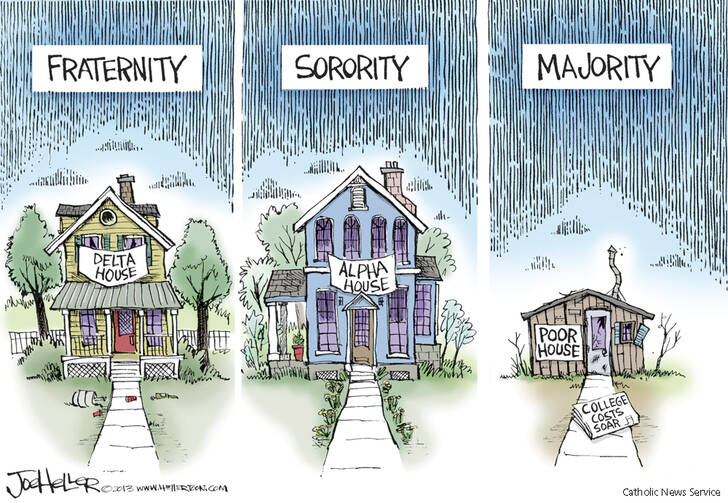One of the givens of our culture is the pro-college mentality. It's just one of those taken-for-granted assumptions -- the idea that, all things considered, students should attend college. But a recent op-ed poses a valid question: Is college for everyone?
Writing in yesterday's Wall Street Journal, Richard Vedder and Christopher Denhart offer some insightful thoughts on the drop in total college enrollment and the diminishing value of a college degree.
Why the drop? According to the authors, "The answer is simple: The benefits of a degree are declining while costs rise." Vedder and Denhart point out that there are "more college graduates working in retail than soldiers in the U.S. Army, and more janitors with bachelor's degrees than chemists. In 1970, less than 1% of taxi drivers had college degrees. Four decades later, more than 15% do." They continue:
A key measure of the benefits of a degree is the college graduate's earning potential—and on this score, their advantage over high-school graduates is deteriorating. Since 2006, the gap between what the median college graduate earned compared with the median high-school graduate has narrowed by $1,387 for men over 25 working full time, a 5% fall. Women in the same category have fared worse, losing 7% of their income advantage ($1,496).A college degree's declining value is even more pronounced for younger Americans. According to data collected by the College Board, for those in the 25-34 age range the differential between college graduate and high school graduate earnings fell 11% for men, to $18,303 from $20,623. The decline for women was an extraordinary 19.7%, to $14,868 from $18,525.
Because of these alarming statistics, Vedder and Denhart argue that colleges must change.
First, colleges will have to constrain costs. Traditional residential college education will not die because the collegiate years are fun and offer an easy transition from adolescence to adulthood. But institutions must take a haircut. Excessive spending on administrative staffs, professorial tenure, and other expensive accouterments must be put on the chopping block.Second, colleges must bow to new benchmarks assessing their worth. With the advent of electronic learning--including low-cost computer courses and online courses that can reach thousands of students around the world--there is more market competition than ever. New tests are being devised to assure employers that individual students are vocationally prepared, helping recruiters discern which institutions deliver superior academic training.
The authors acknowledge that "poorly endowed and undistinguished schools may bite the dust," but they welcome that cleansing. In their words, what's coming is "creative destruction . . ."








